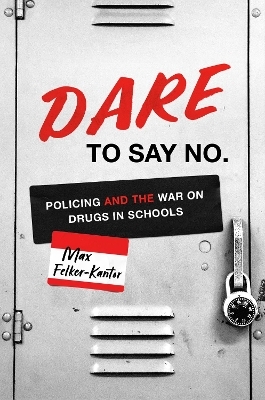
DARE to Say No
Policing and the War on Drugs in Schools
Seiten
2024
The University of North Carolina Press (Verlag)
978-1-4696-7904-4 (ISBN)
The University of North Carolina Press (Verlag)
978-1-4696-7904-4 (ISBN)
Presents the first history of DARE (Drug Abuse Resistance Education), which began in Los Angeles in 1983 as a joint venture between the police department and the unified school district. By the mid-1990s, it was taught in 75 percent of school districts across the United States.
With a signature "DARE to keep kids off drugs" slogan and iconic t-shirts, DARE (Drug Abuse Resistance Education) was the most popular drug education program of the 1980s and 1990s. But behind the cultural phenomenon is the story of how DARE and other antidrug education programs brought the War on Drugs into schools and ensured that the velvet glove of antidrug education would be backed by the iron fist of rigorous policing and harsh sentencing.
Max Felker-Kantor has assembled the first history of DARE, which began in Los Angeles in 1983 as a joint venture between the police department and the unified school district. By the mid-1990s, it was taught in 75 percent of school districts across the United States. DARE received near-universal praise from parents, educators, police officers, and politicians and left an indelible stamp on many millennial memories. But the program had more nefarious ends, and Felker-Kantor complicates simplistic narratives of the War on Drugs and shows how policing entered US schools and framed drug use as the result of personal responsibility, moral failure, and poor behavior deserving of punishment rather than something deeply rooted in state retrenchment, the abandonment of social service provisions, and structures of social and economic inequality.
With a signature "DARE to keep kids off drugs" slogan and iconic t-shirts, DARE (Drug Abuse Resistance Education) was the most popular drug education program of the 1980s and 1990s. But behind the cultural phenomenon is the story of how DARE and other antidrug education programs brought the War on Drugs into schools and ensured that the velvet glove of antidrug education would be backed by the iron fist of rigorous policing and harsh sentencing.
Max Felker-Kantor has assembled the first history of DARE, which began in Los Angeles in 1983 as a joint venture between the police department and the unified school district. By the mid-1990s, it was taught in 75 percent of school districts across the United States. DARE received near-universal praise from parents, educators, police officers, and politicians and left an indelible stamp on many millennial memories. But the program had more nefarious ends, and Felker-Kantor complicates simplistic narratives of the War on Drugs and shows how policing entered US schools and framed drug use as the result of personal responsibility, moral failure, and poor behavior deserving of punishment rather than something deeply rooted in state retrenchment, the abandonment of social service provisions, and structures of social and economic inequality.
Max Felker-Kantor is associate professor of history at Ball State University.
| Erscheinungsdatum | 29.02.2024 |
|---|---|
| Reihe/Serie | Justice, Power and Politics |
| Zusatzinfo | 17 halftones, 3 graphs, 3 tables |
| Verlagsort | Chapel Hill |
| Sprache | englisch |
| Maße | 155 x 235 mm |
| Gewicht | 272 g |
| Themenwelt | Geisteswissenschaften ► Geschichte ► Regional- / Ländergeschichte |
| Sozialwissenschaften ► Ethnologie | |
| Sozialwissenschaften ► Pädagogik ► Allgemeines / Lexika | |
| Sozialwissenschaften ► Pädagogik ► Bildungstheorie | |
| Sozialwissenschaften ► Soziologie | |
| ISBN-10 | 1-4696-7904-3 / 1469679043 |
| ISBN-13 | 978-1-4696-7904-4 / 9781469679044 |
| Zustand | Neuware |
| Informationen gemäß Produktsicherheitsverordnung (GPSR) | |
| Haben Sie eine Frage zum Produkt? |
Mehr entdecken
aus dem Bereich
aus dem Bereich
Erinnerungen
Buch | Softcover (2024)
Pantheon (Verlag)
16,00 €


